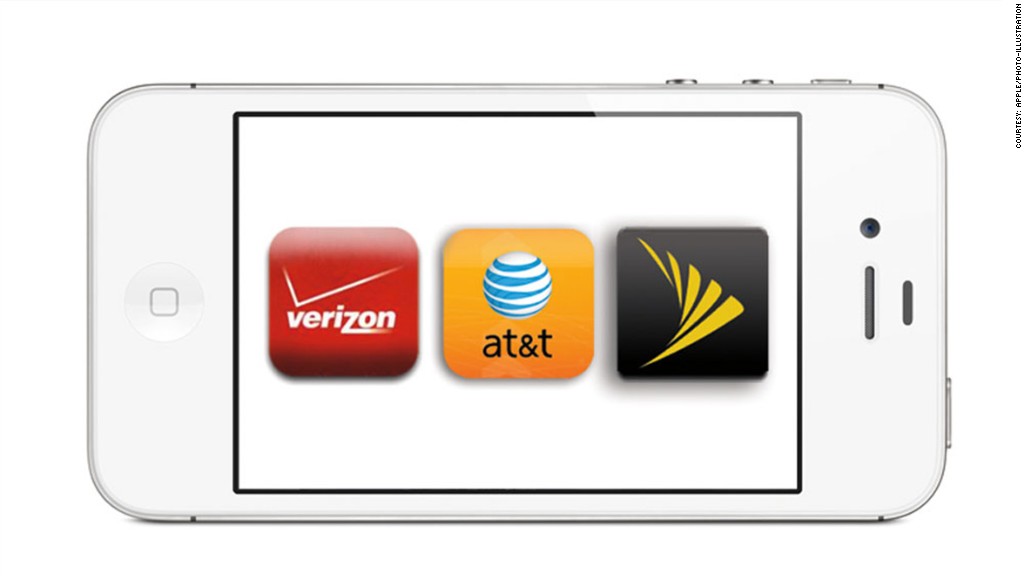
After several quarters of record profit margins, it's time for carriers to face a grim reality: The iPhone 5 is expected to be the best-selling phone of all time, and its sky-high subsidies will devastate their bottom lines.
The price customers typically pay for a new iPhone is a heavily discounted rate cushioned by the carriers, who buy the devices from Apple (AAPL) for close to their full retail price tags. (The 16 GB iPhone 4S that generally goes for $199 with a two-year contract has a list price of $649.) Carriers eat the difference and make it up by padding the monthly cost of their customers' phone contracts.
The iPhone's subsidy typically runs about $400 per device -- the highest of any smartphone on the market. If the iPhone 5 goes on sale Sept. 21 (a widely rumored date), analysts are forecasting sales of 5 million units in the final 10 days of the current quarter, and four times that number over the next three months.
That's a huge upfront cost for the carriers to bear, and it means that wireless service margins, a closely watched metric, will sink hard. AT&T and Verizon's margins hit record highs last quarter. Once the iPhone 5 lands, Wall Street analysts expect those margins to plummet again to near the historic lows they set a year earlier, when the iPhone 4S first went on sale.
Verizon's (VZ) margin is expected to sink by more than six percentage points, according Kevin Smithen of Macquarie Securities. That's a huge swing in an industry where tiny changes can have investors jumping for joy or hiding under their desks.
AT&T (T) and Sprint's (S) drops are expected to be even more dramatic, with Sprint's margin falling by nearly nine percentage points and AT&T's sinking by more than 11 points between the second and fourth quarters, by Smithen's estimates.
"The impact of selling millions of iPhones is going to be pretty significant," Smithen said.
Related story: The iPhone is bigger than all of Microsoft
The carriers' huge stock rallies, which began in April, ended abruptly in August. Stockholders are waiting to see how bad the damage is.
Here's the good news: The short-term nosedive will hurt, but the bigger picture is a much brighter one.
The iPhone is ultimately good for cell phone carriers -- an argument Sprint CEO Dan Hesse has made repeatedly to explain why his company is spending billions to carry it. Customers love their iPhones, and iPhone subscribers use a whole lot of data, which they increasingly have to pay for by the gigabyte.

That means carriers make up much of the iPhone's giant subsidies over the span of a typical two-year contract, and then some. The trend line for carriers' margins is actually pointing up over the past several years, even though they go for a roller-coaster ride each time a new iPhone is launched. Hesse insists that the iPhone will eventually be his company's most profitable smartphone.
Carriers are doing what they can to soften the blow of iPhonepalooza. Since the iPhone 4S launch, the networks have made their upgrade policies more restrictive by raising activation fees, forcing customers to adopt tiered plans and lengthening the time customers need to stay under contract to become eligible for a new phone.
"These moves should result in fewer total upgrades and a lower per-subscriber net subsidy expenses than seen in prior launches," said Mike McCormack, analyst at Nomura Securities.
Apple's challenge is maintaining the delicate balance between charging the highest subsidies in the land -- a cost that is now getting passed on to the consumer -- and keeping its customers happy. So far, it's working. Analysts expect U.S. customers to snap up 20 million iPhone 5 devices this year.
As Apple CEO Tim Cook put it in July on a conference call with analysts: "We are going to continue to focus on making the best product, and I think that the carriers will be very motivated to make sure that they provide that to the customers."

